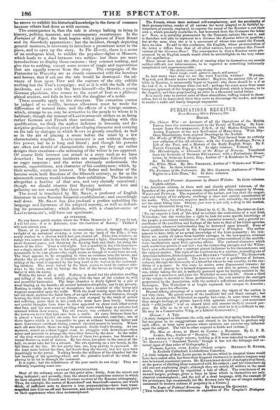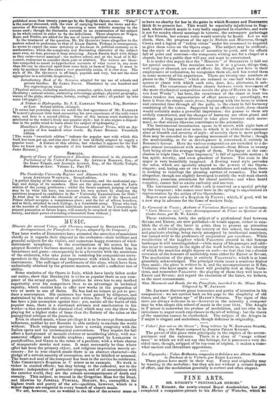PUBLICATIONS RECEIVED.
From February 161h to February 22d.
BOOKS.
The Chinese War : an Account of all the Operations of the British Forces, from the commencement to the Treaty of Nanking. By Lien- tenant JOHN OUCHTERLONY, F.G.S., of the Madras Engineers, late Acting Engineer at the new Settlement of Hong-kong. With fifty- three Illustrations, from original Drawingsby the Author. The Works of William Shakespeare. The Text formed from an entirely new collation of the old editions ; with the Various Readings, Notes, a Life of the Poet, and a History of the Early English Stage. By J. PAYNE COLLIER, Esq., F.S.A. In eight volumes. Volume I. The Hebnskringla, or Chronicle of the Kings of Norway. Translated from the Icelandic of SNORRO STURLESON, with a Preliminary Disser- tation, by SAMUEL LAING, Esq., Author of " A Residence in Norway," &c. In three volumes.
The White Mask. By Mrs. THOMSON, Author of" Widows and Widow- ers," &c. In three volumes. The Fortunes of the Falconars. By Mrs. GORDON, Authoress of" Three Nights in a Life-Time," &c. In three volumes.
Speeches and Forensic Arguments by Daniel Webster. In three volumes. Eighth edition.
[An American edition, in three well and closely printed volumes, of the Speeches of the great American orator, imported into this country by Messrs, WILEY and PUTNAM. The reputation of the author, not less than the magni- tude and variety of his subjects, challenge a close and careful examination Of his works. This, however, requires much time ; and, unluckily, the present is not the most fitting time. Oratory just now is not only a drug in the market, but a very distasteful drug too.] Confessions of a Whitefnut. Edited by G. C. H., Esq., Barrister-at-Law. [No one expects a book of this kind to contain the confessions of a real Irish Whitefoot; but the reader has a right to look for some specific knowledge of the people, a consistent exhibition of the character assumed, and a general re- semblance of the condition and feelings of the hero to that of his fellow agrarian conspirators, whatever individuality may be bestowed upon himself. None if these qualities are displayed in the Confessions of a Whitefoot. The author appears to have little or no actual knowledge of the Irish peasantry ; his inci- dents are nearly all taken from horrible outrages in the newspapers, criminal trials, and accounts of vengeance or of ferocious crime contained in the multifa- rious lucubrations upon Irish agrarian affairs. The national character which such narratives possess is not lost ; but the connecting passages and the White- foot's own reflections offer a contrast almost ludicrous to his circumstances and the subject-matter. The style of the Confessions is a mixture, reminding one of American inflation, Irish eloquence, and BULWER'S "brilliancy." The framework of the story is equally unreal. The hero is the son of a gentleman of fortune, reduced, through the dishonesty of a friend for whom he was security, to the con- dition of a peasant. In this state he assists some dispossessed tenants; for which act of charity he is himself dispossessed, and dies in prison; when his son, whilst taking the air, is suddenly pounced upon for having assisted in the pursuit of a murderer, and joins the Whitefeet to save his life. About a third of the volume is devoted to these preliminaries; the rest narrates the outrages perpetrated by the Association, with the author's reflections and declamations thereupon. The Whitefoot is at length captured, but escapes to America; whence he pens his effusions. Beyond taking advantage of a current subject, the object of the author is not very clear. He paints many of the landlords bad and black enough ; but then, he describes the Whitefeet as equally bad—nay, in some sense worse, aa they mingle feelings of private hatred with agrarian revenge ; and sometimes their "wild justice " is of an absurd kind and counter to their avowed pur- pose. He tells us he is not a Repealer; but what he is it is difficult to say. He may be a Conservative Whig, or a Liberal Conservative.1 Honour ! A Tale. [A story designed to illustrate the evils and miseries that spring from duelling; but too gross in its exaggerations and absurd in its horrors to produce any such effect, at least upon persons whose opinions can exercise any influence upon the subject. The tale in other respects is feeble and verbose.] The Man at Arms or Henri de Cerons ; a Romance. By G. P. IL JAMES, Esq., Author of "Darnley," &c. Third edition. [A. new edition in a single volume, looking as if it were intended to range with !Jr. BENTLEY'S " Standard Novels," though it has not the titlepage and ex- ternal signs of that order of bibliography.] Poemata Lyrica, versa Latino rimante seripta. RENRICO D. RYDER, in Ecclesii Cathedrali Lichfieldensi Canonico. EA little volume of short Latin poems in rhyme, which in classical times would have been called odes, but from their frequent treatment in modern tongues may now be termed occasional poems. Mr. RYDER is not devoid of metaphysical fancy, or the power of eliciting ideas connected with his subject ; and his verses have an odd and not unpleasing jingle, although they are nearly all written in the satria metre, which produces by repetition a loss of effect. The remoteness of ea unused tongue, perhaps, gives a force to ideas which in themselves are only classical commonplaces ; and the veil of a dead language, with the example of his prototypes, has occasionally led Mr. RYDER into the use of images scarcely consonant to modern notions of propriety in a Canon.] The Logic of Political Economy. By Taoms.s DE QUINCEY. EThis volume is the continuation or expansion of The Templar's Diakputs published more than twenty years ago by the English Opium-eater. "Value" is the matter discussed, with the view of carrying forward the views and dis- coveries of RICARDO, chiefly by annexing a more definite meaning to the terms used ; though the discussion extends to an examination of the subject in its whole extent in order to fix the definitions. Three chapters on Wages, Rent, and Profits, are added for the use of tyros in political economy. In the treatment of the question, Mr. DE QUINCEY leans altogether to the modern school in preference to that of ADAM SMITH. Perhaps in consequence, he seems to expect the same certainty or fixedness in political economy as in mathematics; which the complexity and fluctuating character of the subject must ever, we fear, prevent it from attaining. ADAM &arra dealt with things as they exist—never unmixed: the modern school, and at the head of it RI- CARDO, endeavour to consider them pure or abstract. The writers are there- fore compelled to resort to hypothetical accounts of what never is, any more than life CAU be observed apart from some body or form of living. It must be only by accident that RICARDO'S rent practically exists, if it ever does. The style of Mr. DE QUINCEY is off-hand, popular, and racy, but not the most appropriate to a scientific disquisition.] Introductory Book of the Sciences, adapted for the use of schools and private families. By JAMES NICOL. illustrated by one hundred and five engravings on wood.
[Physical science, including mechanics, acoustics, optics, heat, astronomy, and chemistry; natural science, embracing mineralogy, geology, physical geography, waters of the globe, atmosphere, botany, zoology, and man ; all packed up into some 140 pages!]
A Tribute to Hydropatliy. By J. E. EARDLEY WILMOT, Esq., Barrister- at-Law. Second edition, enlarged. It seems but yesterday since we noted the first appearance of Mr. EARDLEY Wriarom's pleasant little book recounting his own experience of the cold-water cure, and here is a second edition. Some of this success must doubtless be attributed to the writer's lively and popular style ; but it also argues a disposi- tion in the public mind to learn about the subject of hydropathy.] Hamilton's Dictionary of Two Thousand Musical Terms, with an Ap- pendix of five hundred other words. By JOHN Burton. Twentieth edition.
[The words "twentieth edition" indicate the popular tact with which this work has been got up, and also show that it was skilfully adapted to supply a popular want. A feature of this edition, but whether it appears for the first time we know not, is an appendix of five hundred additional words, by Mr. JOHN BISHOP.]
SERIALS.
Reports of Cases of Controverted Elections determined in the fourteenth Parliament of the United Kingdom. By ARTHUR Bean" Esq., of the Inner Temple, and ALFRED AUSTIN, Esq., of the Middle Temple, Barristers-at-Law. Volume 1., Part IV.
ALMANACKS.
The Cambridge University Register and Almanac/I, for 1844. By WIL- LIAM ATKINSON WARWICK. Second edition. LA perfect display of the statistics of the University, and the academical say- ings and doings of its members. Here are the prize poems, and the Latin oration of the young gentlemen ; whilst the future aspirant, judging of what may be by what has been, can measure his own powers by studying the questions proposed to candidates in the " University Examinations for 1843." In what may be Called the chronicle of events, the visit of the Queen and Prince Albert occupies a conspicuous place; and the list of offices, benefices, and so forth, attached to each College, is a formidable array. Those who look at the number of well-connected individuals interested in the Universities by present possession or future hopes, will scarcely be surprised at their hold upon ' society, and their power of resisting reformation from without.]



























 Previous page
Previous page